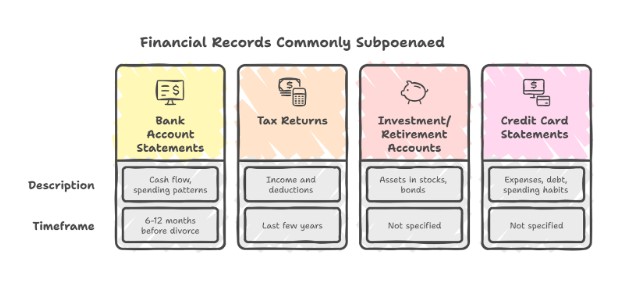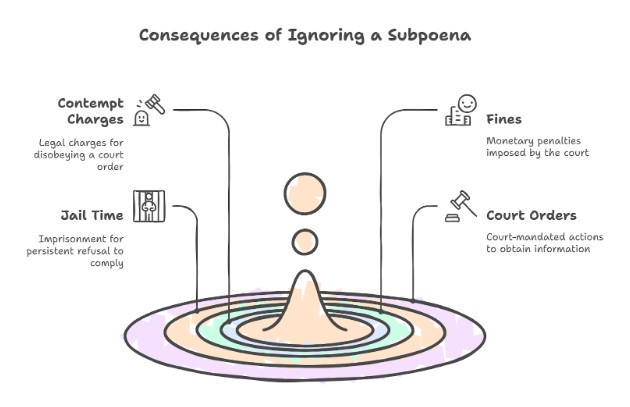

Originally published: July 2025 | Updated: August 2025
Divorce in Cook County can involve complex financial matters. If one spouse isn’t sharing key financial details, it’s tough to see what’s going on with assets and income.
Subpoenas give you a legal way to get financial records when someone won’t hand them over.
You can use subpoenas to ask directly for bank statements, tax returns, and other important documents from employers, banks, or investment companies.
This process enables both parties to review the necessary information to determine property, support, and parenting time.
Divorce brings a lot of stress, especially when money is involved. Knowing you can use subpoenas to get hidden or withheld records can help you feel more in control as you build your case.
A subpoena is a legal document you use during a divorce to make someone or an organization give evidence or testify in court.
In Cook County, subpoenas are pretty common for getting information that isn’t being shared willingly.
There are two main types you’ll see in divorce cases:
These legal orders are beneficial when a spouse attempts to withhold vital information from the other spouse.
You can use subpoenas to get details about assets, bank accounts, or debts—stuff that matters for property division or support.
For example, a lawyer might send a subpoena to a bank or employer to get financial data that the other spouse won’t provide.
In Cook County, you can send subpoenas to:
Just ensure you’re only requesting documents or testimony related to the divorce, such as financial records or evidence of parenting ability.
Concerned your spouse is hiding income or assets? The Cooper Trachtenberg Law Group uses subpoenas effectively to secure financial records in Cook County—schedule a confidential consultation today.
If you’re ready to get started, call us now!
A subpoena helps you get important financial records from a spouse, bank, or third party in a divorce. Sometimes, the other side just won’t hand over what you need.
Here’s why people use subpoenas:
Financial records you might request include:
| Record Type | Purpose |
| Bank statements | Track deposits, withdrawals, and transfers |
| Tax returns | Confirm income, deductions |
| Pay stubs | Show current earnings |
| Credit card statements | Identify spending habits |
| Loan applications | Reveal financial obligations |
When someone doesn’t share records, a subpoena enables attorneys and courts to obtain the necessary information for a fair divorce outcome. This protects everyone, including the kids.

Attorneys in Cook County typically review financial documents to determine the actual financial situation of both spouses.
These records assist the court in determining support, property division, and debts.
Other records lawyers might request:
| Record Type | Purpose / Use |
| Pay stubs and wage records | Track earnings and verify income |
| Loan documents | Show outstanding debts or financial obligations |
| Business financial records | If self-employed, demonstrate business value |
| Mortgage and property records | Verify ownership and equity in real estate |
Sometimes, you need access to court records, too—maybe to check old agreements or judgments about finances.
All of this helps build a complete picture of each spouse’s financial status during the divorce.
Need help getting the financial documents your spouse won’t share? Let Cooper Trachtenberg Law Group take action with precise legal subpoenas—reach out to protect your future.
If you’re ready to get started, call us now!
If you need financial records during a Cook County divorce, you might have to issue a subpoena.
This formal court order instructs a person or organization to produce documents or appear to give testimony at a deposition.
When you need records for a hearing or trial, you’ll want a deposition subpoena.
The clerk of the circuit court of Cook County prepares and issues subpoenas. You ask the clerk’s office, either in person or through the court’s e-filing system.
The sheriff, a deputy, or any adult over 21 (who isn’t part of the case) can serve the subpoena.
Key Steps for Issuing a Subpoena:
You can use the electronic docket to track court events, see court documents, or check if your subpoena has been filed or served. It’s a handy way to avoid missing deadlines.
Ensure that you complete all forms accurately and submit them to the correct individuals. This helps keep your case moving and avoids headaches for everyone.

Ignoring a subpoena is no small matter. In Cook County divorce cases, subpoenas are issued as formal court orders.
Therefore, you must take them seriously. If you don’t respond, the court can intervene quickly.
The most common risk? Contempt of court. That’s just legal talk for disobeying a judge’s clear order.
Some legal consequences include:
Courts don’t like it when you ignore a subpoena—it’s almost like you’re daring them to act. Sometimes, even your lawyer could get caught up in the trouble.
Action Taken | Possible Result |
| No response | Contempt charge, fine, or jail |
| Late response | Warning or court sanctions |
| Legal challenge filed | The court reviews the objection |
Judges don’t mess around when it comes to financial info. Ignoring a subpoena? Honestly, you should never consider it without consulting a lawyer first.
Divorce is already difficult—don’t let missing financial records make it worse. In Cook County, subpoenas offer a reliable way to gather the documents you need to ensure fairness in property division, support, and parenting matters.
Whether your spouse is withholding information or you suspect hidden assets, acting quickly with the help of a qualified divorce attorney can make all the difference.
Take control of your divorce with clarity. Cooper Trachtenberg Law Group will fight to uncover the financial truth—contact us now to get the support you deserve.
What is a subpoena in a Cook County divorce?
A subpoena is a court-ordered demand for documents or testimony. In divorce, it’s used to obtain financial records when the other spouse refuses to share them.
What types of financial records can be subpoenaed?
Bank statements, tax returns, credit card statements, pay stubs, investment accounts, loan applications, and property documents can all be requested with a subpoena.
Can a subpoena reveal hidden assets?
Yes. Subpoenas can uncover hidden income, secret bank accounts, or undeclared assets, which are essential for the fair division of property and support calculation.
How do I issue a subpoena in Cook County?
You file the correct subpoena forms with the Clerk of the Circuit Court and have them served by an eligible adult. Subpoenas must comply with local court procedures, including proper notice and adherence to deadlines.
What happens if someone ignores a subpoena in divorce court?
Failing to comply with a subpoena can result in fines, contempt of court, or even imprisonment. The court may also issue orders to compel compliance and recover the necessary records in an alternative manner.
To whom can subpoenas be served during a divorce?
Subpoenas may be served to individuals, banks, employers, accountants, or any third party holding records relevant to financial matters in the divorce.